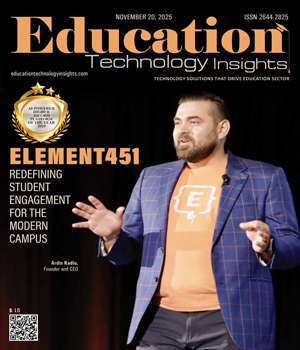THANK YOU FOR SUBSCRIBING
Be first to read the latest tech news, Industry Leader's Insights, and CIO interviews of medium and large enterprises exclusively from Education Technology Insights
Human-Centered Approach for Redefining Graduate Success
Dr. Sage Mauldin, Director of Professional Development and Engagement, University of Oklahoma
 Dr. Sage Mauldin, Director of Professional Development and Engagement, University of Oklahoma
Dr. Sage Mauldin, Director of Professional Development and Engagement, University of OklahomaDr. Sage Mauldin serves as Director of Professional Development and Engagement at the University of Oklahoma, overseeing programs that foster career preparation for graduate students and postdocs. A scholar in critical higher education policy studies, Dr. Mauldin has received multiple awards and honors and actively promotes access and fairness in academia and the broader community.
In an exclusive interview with Education Technology Insights Dr. Mauldin shares his invaluable insights regarding the latest developments in the professional development space, the prevailing challenges and the possible solutions.
From Therapy to Higher Ed Leadership
My career path hasn’t been linear. I started out as a therapist in the private sector, then made the shift into higher education. I like to think my background in psychology gives me a unique edge; it helps me understand that people, especially graduate students, have layered and complex needs. Yes, they need technical skills, but they also need support with things like communication, leadership, managing stress, and dealing with imposter syndrome.
That awareness shapes my entire approach, which is deeply human. I don’t believe you can support just one part of a person, e.g., the technical, without also paying attention to their socio-emotional needs. That understanding shows up in everything I do, from the programs I design and manage to the way I show up in the classroom as an instructor.
“To truly support students holistically, leaders should, in no particular order, adopt a well-rounded skills framework that includes both technical and socio-emotional competencies, and create varied practice opportunities, such as workshops and peer mentoring”
I offer a range of series that focus on both technical and socio-emotional skills. For example, the Non-Academic Job Series helps students prepare for careers beyond the professoriate, while the Academic Job Series supports those pursuing faculty roles. Other offerings address often-overlooked areas like navigating departmental culture or managing stress. In this way, my program provides wraparound support, something that I believe truly sets it apart.
Closing Gaps in Graduate Education
Graduate education does an excellent job of building technical expertise. However, I’ve noticed an increasing need for intentionally developing soft skills like effective communication, leadership, strategic networking, and ethics. Being a subject matter expert is important, but it’s equally vital to communicate that expertise confidently, lead with integrity, i.e., embodying a leadership philosophy that moves mountains and changes lives, and build genuine professional relationships. These skills aren’t hierarchical; they’re all essential to a student’s long-term success.
Measuring Belonging and Well-Being
While areas like belonging, resilience, and well-being are more difficult to quantify than technical skills, I use targeted surveys to measure both knowledge acquisition and the application of skills developed through my webinars and workshops. I ask participants not only what they learned, but how they are applying those insights in real time (in their academic work, professional development, and personal well-being). This combination of self-reported outcomes and behavioral indicators helps me better understand impact and continuously refine my programming.
Looking ahead, I believe two major trends will reshape how we prepare graduate students over the next five years. First, micro credentials—short, focused credentials that build both hard and soft skills—will become increasingly central to giving graduate students a competitive edge in an ever-changing job market.
Second, the rapid evolution of AI will require higher education to adapt more intentionally. Graduate students need to be fluent with AI as a tool, just like previous generations learned to use calculators; not be fearful of it. The most successful programs will teach how to use AI ethically and effectively.
Advice for Higher Ed Leaders
To truly support students holistically, leaders should, in no particular order, adopt a well-rounded skills framework that includes both technical and socio-emotional competencies, and create varied practice opportunities, such as workshops and peer mentoring.
They should also focus on applied learning rather than just knowledge acquisition, and listen to students, using their feedback to shape responsive, relevant support.
Read Also
What is Edtech Leadership in 2026
Designing Academic Leadership Around Real Lives
Why Student Success Begins with Being Seen
Inclusion is not a Department: The Systemic Ripple Effect of Belonging
When Education Meets Industry: Designing Learning That Actually Solves Business Problems
Faculty Support is not a Service. It is a Philosophy Guiding Digital Transformation

I agree We use cookies on this website to enhance your user experience. By clicking any link on this page you are giving your consent for us to set cookies. More info

However, if you would like to share the information in this article, you may use the link below:
www.educationtechnologyinsightsapac.com/cxoinsights/dr-sage-mauldin-nid-3494.html





















